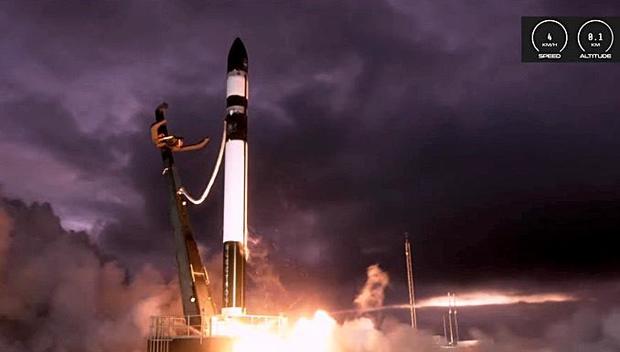The second stage of a Rocket Lab Electron rocket carrying seven small satellites malfunctioned after launch from New Zealand on Saturday, suddenly slowing down and losing altitude. The company confirmed the vehicle and its payloads were lost, but no indication of what went wrong was immediately available.
“We lost the flight late into the mission,” company CEO Peter Beck tweeted. “I am incredibly sorry that we failed to deliver our customers satellites today. Rest assured we will find the issue, correct it and be back on the pad soon.”
Rocket Lab’s innovative Electron launcher, featuring 3D-printed engines and battery-powered fuel pumps, is designed to launch small satellites into low-Earth orbit at a relatively low cost, providing access to space for payloads that otherwise might have to wait for more expensive rides aboard larger boosters.
The rocket launched Saturday was making the company’s 13th flight. It was carrying an experimental imaging satellite built by Canon, five “SuperDove” Earth-observation imaging satellites owned by Planet and a small technology demonstration satellite built by the British firm In-Space Missions.
The Electron blasted off from Rocket Lab’s picturesque launch site on the rocky coast of the Mahia Peninsula at 5:19 p.m. EDT. The nine Rutherford engines powering the first stage performed normally, boosting the rocket out of the lower atmosphere. The second stage, featuring a single vacuum-optimized engine, then took over.
But about five minutes and 41 seconds after takeoff, telemetry provided by Rocket Lab, displayed along with company-provided video from cameras on the rocket, showed the stage’s velocity peaking at around 8,509 mph, at an altitude of about 119 miles, and then starting to drop.
The altitude continued to increase for another 26 seconds or so, reaching 121 miles, before it, too, began decreasing. Rocket Lab ended its launch webcast a few minutes later without any comment on the telemetry or outcome of the mission. But Beck confirmed loss of mission a few minutes after that.
Rocket Lab, founded in New Zealand and now headquartered in Long Beach, California, launched its first Electron in 2017. The flight was terminated after a loss of telemetry, but the booster was operating normally at the time. Saturday’s loss was the company’s second Electron failure in 13 flights.
Spaceflight, a company that brokers rideshare missions, including Canon’s launch Saturday, said in a statement “we are of course disappointed, while at the same time are always aware that launch failures are part of the business of space.”
“We will work closely with Rocket Lab and our customer Canon Electronics who had their CE-SAT-IB imaging satellite onboard this mission to figure out the next steps, but we are undeterred in our resolve to get our customers to space. Our hearts go out to all the teams who worked so hard on this mission.”
A statement from Planet expressed support for Rocket Lab.
“While it’s never the outcome that we hope for, the risk of launch failure is one Planet is always prepared for,” the company said on its website. “We already have 26 SuperDoves … slated for launch on (an Arianespace) Vega rocket later this summer, and several other launches over the next 12 months are on the manifest.”
“We have full faith that Rocket Lab will be able to bounce back from today’s failure in no time, and we look forward to flying on the Electron again,” Planet added.
Finally, In-Space tweeted its team was “absolutely gutted by this news. Two years of hard work from an incredibly committed group of brilliant engineers up in smoke. It really was a very cool little spacecraft.”


